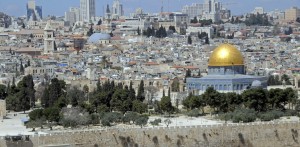The Church in the Heart of Israeli-Jewish Society
 With a formal Pontifical Mass the Latin Patriarch Fouad Twal of Jerusalem inaugurated the first Catholic pastoral center for migrant workers in Israel on April 26 in Tel Aviv.
With a formal Pontifical Mass the Latin Patriarch Fouad Twal of Jerusalem inaugurated the first Catholic pastoral center for migrant workers in Israel on April 26 in Tel Aviv.
Those present included the Apostolic Nuncio in Israel, Archbishop Giuseppe Lazzarotto, and the Ambassador of the Philippines in Israel.
Father David Neuhaus SJ, coordinator of the Patriarchate for migrants’ pastoral care and initiator of the project, thanked international Catholic pastoral charity Aid to the Church in Need (ACN) for its support.
“It would have been impossible to found the Our Lady of Valor Pastoral Center without the generous help of various charities, such as those that have accompanied the development of the Hebrew-speaking Catholic Church in Israel very closely and are now also helping the migrants.”
Father Neuhaus stressed that the Church of the Holy Land, which to-date has comprised mainly Arabic-speaking Palestinian Christians, was becoming much more diverse in its composition.
“The migrants are making the Christian presence more complex since many of them come from Asia, Africa and Eastern Europe and live within the Israeli-Jewish, Hebrew-speaking society,” he said.
“Although they remain on the margins of this society, they identify with it and their children grow up speaking Hebrew.”
“The Church is now called upon to establish itself where it previously had no presence: in the Jewish neighborhoods where the migrants live, in the heart of Israeli-Jewish society,” Neuhaus explained.
Migrant workers are very grateful for the new center. Lourdes, a Filipino woman working as a home nurse, is committed to helping during church services in the community.
“For us, the center is home. Here we meet our compatriots and we can pray. I’m happy we have it,” she told ACN.
The new pastoral center in the south of Tel Aviv serves the community of Catholic migrants in Israel, which includes guest workers from the Philippines, India and Sri Lanka, as well as asylum seekers from Sub-Saharan Africa.
The number of guest workers has increased sharply in the wake of the Second Intifada, the Palestinian uprising against the Israeli occupation that started in 2000.
Since then most of the Palestinians who had been working previously in Israel were no longer granted a work permit. Many of the jobs they used to do have now been taken over by guest workers.
Today about 40,000 Filipinos alone live in Israel on the basis of limited-term employment contracts. Like Lourdes, they work mostly in care-taking occupations.
The Church sees the catechetical instruction and cultivation of a religious identity among migrant children as a special challenge. They attend Hebrew-speaking schools and receive no religious instruction there.
The Patriarchate has obtained a number of Hebrew-language books to support religious instruction outside school hours.

